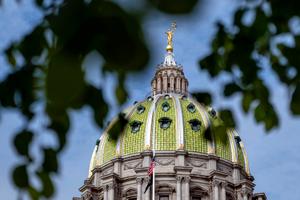Spotlight PA is an independent, nonpartisan newsroom powered by The Philadelphia Inquirer in partnership with PennLive/The Patriot-News, TribLIVE/Pittsburgh Tribune-Review, and WITF Public Media. Sign up for our free newsletters.
HARRISBURG — Pennsylvania lawmakers have sent Democratic Gov. Tom Wolf a $45.2 billion spending plan that boosts education spending by more than $1 billion, creates a new child care tax credit, and squirrels away money for a rainy day.
The wide-reaching budget, completed a week after the June 30 deadline, was made possible by higher-than-expected revenues that led to a multibillion dollar surplus. Democrats and Republicans also agreed on a plan to spend $2.2 billion in remaining federal stimulus funds, including $660 million on environmental projects and $375 million on housing.
The state House approved the spending plan in a 180-20 vote Thursday afternoon.
The state Senate followed, in a 47-3 vote, on Friday after a contentious debate on adding language to the state constitution declaring it does not grant any right relating to abortion and requiring voter ID to vote in all instances.
Wolf signed the budget Friday. In a statement, he said the plan solidified “his commitment to education at all levels.”
“Since I took office, Pennsylvania’s students and families have been my top priority,” Wolf said. “We have made long overdue investments in the people of Pennsylvania, including better education for all, safer communities, and a brighter future.”
Overall, the deal represents a 2.9% increase in state spending compared to last year’s budget. Education saw a major investment, with $525 million more appropriated for K-12 schools, $225 million for some of the state’s poorest districts, and $100 million each for special education, school safety, and school mental health services.
A tax credit for individuals or businesses who donate to parochial and private schools, so they can in turn offer scholarships to students, was also expanded by $125 million, a 45% increase.
The plan includes a gradual decrease in corporate net income tax from 9.99% to 4.99% by 2031, the repeal of new regulations on charter schools, and a $2.1 billion deposit into the state’s rainy day fund, which Republican leaders pointed to as key wins.
“This bill is exactly the medicine this commonwealth needs,” House Appropriations Chair Stan Saylor (R., York) said Thursday on the House floor.
The General Assembly also agreed to spend $2.2 billion in remaining federal stimulus dollars on a number of one-off conservation, water infrastructure, housing, childcare, and public safety projects.
A property tax rebate program for people 65 or older and those with disabilities, typically funded by the Pennsylvania Lottery, will get a one-time $140 million infusion, which represents a 70% expansion.
Last year, the program provided checks to 430,000 renters who make under $15,000 and homeowners who make under $35,000. Someone who received the maximum refund of $650 will receive an additional $455 under the one-year expansion.
The plan also funds a new $125 million home repair program, championed by state Sen. Nikil Saval (D., Philadelphia). The program targets homeowners whose annual income is less than 80% of the area’s median income and landlords who own less than 15 rental units.
Democrats largely backed the budget and stimulus spending plan, seizing the opportunity to at last spend billions provided by the federal government during the pandemic on their priorities and expand state education funding by three-quarters of a billion dollars.
“We are poised to enact the largest increase in education funding in the history of Pennsylvania,” state Sen. Vincent Hughes (D., Philadelphia), minority chair of the chamber’s Appropriations Committee, said Thursday. “To have this kind of increase for the children of Pennsylvania, teachers, those who work in schools, I think is significant.”
Lawmakers also created a new tax credit aimed at supporting working families. People with one or more dependents can claim up to 30% of the childcare expenses they claimed on their federal taxes.
The budget was delayed by a week as state House Republicans tried to withhold funding from four major universities unless the schools swore under oath that they do not “engage in research or experimentation using fetal tissue obtained from an elective abortion.” The ban specifically targeted the University of Pittsburgh.
On Wednesday, the lower chamber took a different course, advancing a clean version of a bill to fund the universities and adding the research ban to unrelated broadband legislation.
The clean bill is now on Wolf’s desk for his approval, and the latter is parked in a state Senate committee.
While some Capitol observers feared the state House would be the one to derail the budget, it was in fact state Senate Republicans who signaled Thursday that all was not well, stating that budget talks were “deteriorating” and “reaching an impasse.”
In the end, it wasn’t the budget package that led to hours of contentious debate but rather an omnibus bill containing five separate proposed constitutional amendments including one on abortion.
WHILE YOU’RE HERE… If you learned something from this story, pay it forward and become a member of Spotlight PA so someone else can in the future at spotlightpa.org/donate. Spotlight PA is funded by foundations and readers like you who are committed to accountability journalism that gets results.
